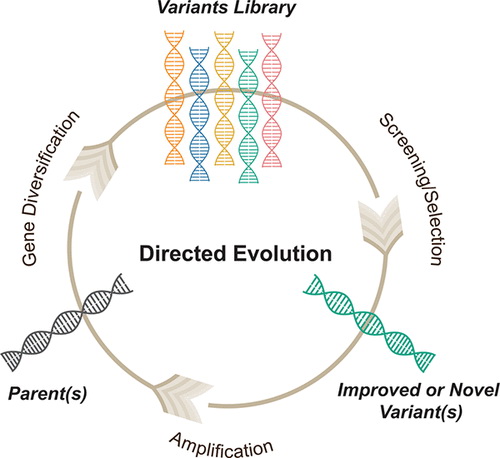EnzymoGenius™ stands at the forefront of the evolving landscape of directed evolution techniques for libraries, offering a cutting-edge service that harnesses the power of enzymatic evolution to propel scientific advancements. Employing state-of-the-art methodologies, our services encompass an array of capabilities aimed at revolutionizing enzyme engineering and optimization.
Overview
Combining directed evolution techniques for libraries involves harnessing evolutionary principles to enhance the diversity and functionality of biomolecular libraries. This innovative approach facilitates the targeted evolution of biomolecules, enabling the generation of variants with improved properties. Noteworthy progress in this realm includes the development of sophisticated screening methodologies and computational tools for the efficient identification of superior biomolecular candidates. Additionally, advancements in high-throughput sequencing technologies have significantly expedited the analysis of diverse libraries, contributing to a deeper understanding of the evolutionary landscape. These collective efforts aim to refine and expedite the optimization of biomolecules for various applications, ranging from enzyme catalysis to therapeutic protein engineering. The ongoing research in this domain continues to refine the methodology and expand its applicability, further elucidating the intricate interplay between directed evolution techniques and library design.
 Fig. 1 Directed evolution for variants library. (Wang Y, et al., 2021)
Fig. 1 Directed evolution for variants library. (Wang Y, et al., 2021)
Our Services
Our comprehensive suite of services includes:
- Library Construction and Diversification
Precision in constructing diverse libraries to facilitate the evolution of enzymes with enhanced functionalities.
- High-Throughput Screening
Employing advanced screening techniques to rapidly identify and isolate enzyme variants with superior properties.
- Error-Prone PCR
Introducing controlled mutations into target genes to generate diverse enzyme variants for directed evolution.
- DNA Shuffling
Facilitating recombination of beneficial mutations from different parental genes, fostering the creation of highly efficient enzymes.
- In Vivo Evolution
Utilizing living organisms to evolve enzymes in their native cellular environments, ensures compatibility with biological systems.
Leading Technology Advantages
- Machine Learning Integration
Harnessing the power of machine learning algorithms to analyze vast datasets, guiding the selection of optimal enzyme variants.
- Quantitative Structure-Activity Relationship (QSAR) Modeling
Employing computational models to predict enzyme behavior and optimize evolutionary strategies.
- Automation and Robotics
Leveraging advanced automation and robotic systems for high-throughput screening, accelerating the evolution process.
- Synthetic Biology Techniques
Incorporating synthetic biology principles to engineer enzymes with tailored functionalities for diverse applications.
- Protein Engineering Expertise
Drawing on a wealth of expertise in protein engineering, ensuring the success of directed evolution campaigns.
Application Areas We Can Serve
- Biocatalysis
Tailoring enzymes for enhanced catalytic performance in industrial processes, promoting sustainability and efficiency.
- Pharmaceuticals
Optimizing enzymes for drug synthesis, expedites the development of novel pharmaceutical compounds.
- Biofuels
Engineering enzymes for improved efficiency in biofuel production, contributing to renewable energy solutions.
- Agriculture
Enhancing enzymes for use in crop protection and improvement, promoting sustainable and resilient agriculture.
- Environmental Remediation
Developing enzymes for the degradation of pollutants, addressing environmental challenges with biotechnological solutions.
Our expertise spans library construction, high-throughput screening, and advanced evolutionary strategies, empowered by machine learning, QSAR modeling, automation, and synthetic biology. With applications ranging from biocatalysis to environmental remediation, our services cater to a spectrum of scientific domains. For unparalleled advancements in enzymatic evolution, contact EnzymoGenius™ and embark on a transformative journey in biotechnology and enzyme engineering.
Reference
- Wang, Y.; et al. Directed evolution: methodologies and applications. Chemical Reviews. 2021, 121(20): 12384–12444.

































 Fig. 1 Directed evolution for variants library. (Wang Y, et al., 2021)
Fig. 1 Directed evolution for variants library. (Wang Y, et al., 2021)